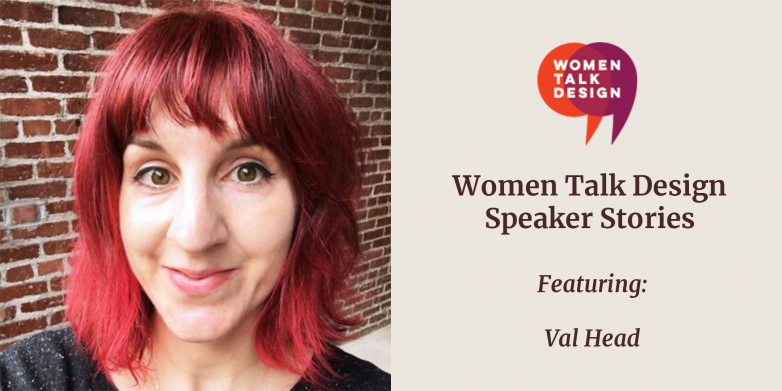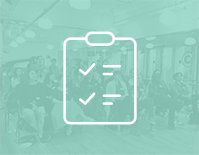Val Head on getting through speaking mishaps
As part of our #WTDSpeakerStories, we spoke with Val Head about her speaking career and some of the bumps she encountered along the way. Here’s a recap on what Val shared.
As part of our Women Talk Design Speaker Stories series, we’re interviewing a Women Talk Design speaker every week about their journeys and experiences. We talk to speakers who are just getting started, speakers who have had their fair share of speaking mishaps, speakers writing books, and speakers curating events. At the end, we offer an opportunity for folks from the WTD community to ask their own questions and connect with each other. Visit our events page for more information about the series and RSVP for our next event.

Val Head is a senior design advocate at Adobe, an author, and a web animation expert. She teaches CSS animation on Lynda.com and curates the weekly UI animation newsletter. Having been published by Fast Company, A List Apart, and Smashing Magazine, Val has also spoken at dozens of events all over the world, including Pixel Up!, Web Directions, and An Event Apart.
On her process for crafting a talk and her experience with a speaking coach
Val had a lot of good advice for speakers who are just figuring out how to find their voice. For Val, her process grew from understanding that she didn’t have to do things exactly the same as everyone else and being able to recognize what worked best for her.
“Some people can write out this beautiful essay and they edit it all down and they can get on stage and say those exact words. I’m kind of jealous of those people because I can’t do it – I would just sound like a robot reading an essay.
I get too stressed out in sticking to it like that…but I find that if I can get started in a very succinct way and set myself up well, then I can take it from there and go. Instead of writing it out, I just do it a million times and my brain will pick like the right parts or the right way to explain stuff out of those times. I write my intro and…write out the end and try to force myself to memorize [that]. And then just practice until the middle sounds good.”
Val has also worked with a speaking coach to improve the way she crafts her story and hone in on her strengths as a speaker.
“I found out that there was such a thing as speaking coaches and a lot of these speakers that I thought were really good at speaking had worked with speaking coaches. I worked with a speaking coach for a little bit and he was really into this idea of crafting the story and having all this structure. It was a great structure to start from and keep me focused so I didn’t end up just babbling for half an hour and I actually know what my point is. Which, when now that I say it out loud, it’s like ‘What? You needed someone to tell you that?’ But yeah, I did. It takes practice to get to that point.”
“I found it was really helpful to just see that kind of insight into someone else’s process and it helped me better figure out mine and see what worked for me and what didn’t. I feel like your personality plays a lot into the way you can be compelling onstage. You have to let your personality show through in some way, I think, to really connect with people. And I think working with a coach and getting that practice can be really useful.”
On her speaking mishaps
Val also shared some of her mishaps on stage, talking about what it’s like to work through them in the moment.
“If you do enough talks, stuff is just gonna go wrong. It happens and it’s totally fine. I could probably, I could fill a day with disasters and I’m still here so it’s okay.”
“At one of my earlier, firstish talks, I thought that I was getting a 60 minute or a 45 minute slot – a normal sounding slot. That’s just what I assumed because it seemed like that’s what every talk on the schedule was. And a few days before,as I was getting ready to go, I looked on the schedule to double check what time I was on and I saw that I actually had a 90 minute slot. So I contacted the conference and [said] I thought I had 60 minutes, and they’re [said,] ‘So and so should have emailed you and asked you if you wanted a 90 minute slot.’ They were insisting that I wouldn’t have been in there unless I had agreed to do it but no one asked me and that made everything super weird.
The day before, I tried to figure out how I could have double the content and make it stretch out and it was super stressful. And right before I started the talk, a friend of mine who was also at the conference was just like, ‘Look, whatever, it’s going to be ok. No one is going to be mad if you finish early and there’s time for questions.’ And it did end up fine, at least for the people in the room because no one knew about that exchange of me not knowing I had 90 minutes. And then I was just a little bit more careful of making sure I double checked how long the talk was supposed to be and that I didn’t get stuck in a double time slot.”
Val has also experienced her share of technical difficulties during talks but has a plan for getting through them now.
“Probably the one that was the hardest in the moment, the one that was like living a speaking nightmare, [was where] I got up on stage, they did my intro and everything was going fine, I was super nervous, and then right when I started talking, the screen went completely blank – none of my slides, nothing.”
“So I just started my talk because I didn’t know what else to do. Thankfully, my talk started with a story which was very helpful. So I just tell this story because I don’t know what else to do – they’ve already introduced me, I can’t leave. And as I was telling the story, which I was trying to make as long as possible, I noticed there were a couple of people running around in the back. So I think, ‘Okay, someone is trying to fix this. That’s awesome. Hopefully they can fix it.’ I got through this story and then just about the time I was done, my slides suddenly came on and everyone applauded because they totally knew I was freaking out. And apparently it was less than five minutes that there were no slides but it was the longest however many minutes of my life. It all worked out in the end, even though in those few minutes, it was terrible.”
“[Now] I always have some kind of related story to the talk to tell. Some other people were speaking at a conference and the power went out. You just keep going. If you know your stuff, you can just keep talking. Some people do say taking improv classes is helpful for speaking and I bet that is exactly why.”
On adjusting to the virtual world
Speaking to a crowded room is a different experience than speaking to your computer screen. Val shared some tips on making virtual talks feel less strange.
“Maybe the best thing and the worst thing about live talks is that the audience is right there. It can make you super nervous – I totally relate to getting super nervous and turning bright red because that happens to me a lot – [but] you get that feedback. If you say a thing, you can tell if people understood it or not because they will either look like they understood or look like they don’t understand. That kind of connection and feedback – just sort of like, we’re all here together talking about this thing – I think it gets totally lost for virtual talks.”
“I noticed that, at the end of virtual talks, it would often be really weird because everyone signs off and then you’re still in your office, talking to your wall. I felt that part was almost depressing. Now, what I’ve started to do is kind of do a thing I did for live talks where I would have some sort of dessert at the end. I’m like, ‘Alright, after this talk, I’m gonna go downstairs and have ice cream.’ And somehow that makes it less weird. Yeah, you’re still in your office. But, you did a talk, you did a thing, and you shared it with people. I think adding something into your routine helps and just trying to build the endurance to keep it real even though you’re not getting that feedback.”
On her advice for new speakers
Val talked about getting started as a speaker and how you don’t have to be an expert to do a talk – you just have to put your ideas out there, keep moving through rejection, and let the knowledge come with practice.
“Put the work you want to do in your portfolio. Like, ‘If I talk about this thing that I’d like to do more of, I’ll get to do more of it.’ [I stopped] trying to be everything to everyone and just tried focusing on this thing that I find really interesting and I’m really excited about sharing. So it was that realization that this is something I really like and I want to share more of and maybe if I share more of it, I’ll get more chances to share more of it.”
“And you don’t have to be an expert already. I think that interest and curiousness is enough. If this is the thing I know somewhat about and I’m not an expert in it but I would like to share or talk about or investigate, you learn a lot putting talks together. That leap of faith is a thing that a lot of people feel.”
“If you submit a talk to an RFP and it doesn’t get selected, it doesn’t mean it was a bad talk idea. There are so many reasons, especially when it’s in that situation of hundreds of submissions and only 10 speaking slots. But even in ones where it’s not that drastic, there’s plenty of reasons depending on how focused the conference is. If you’re submitting talks, submit the same one to multiple places – just tailor it to the different conferences – but if it gets rejected, that’s not a statement on the quality of your talk idea.”
To hear more about Val’s “not so secret mission” to empower designers with animation, how she chooses speaking engagements, and how she found her focus, check out the full video below.
Thank you to AdobeXD for sponsoring this event series!

